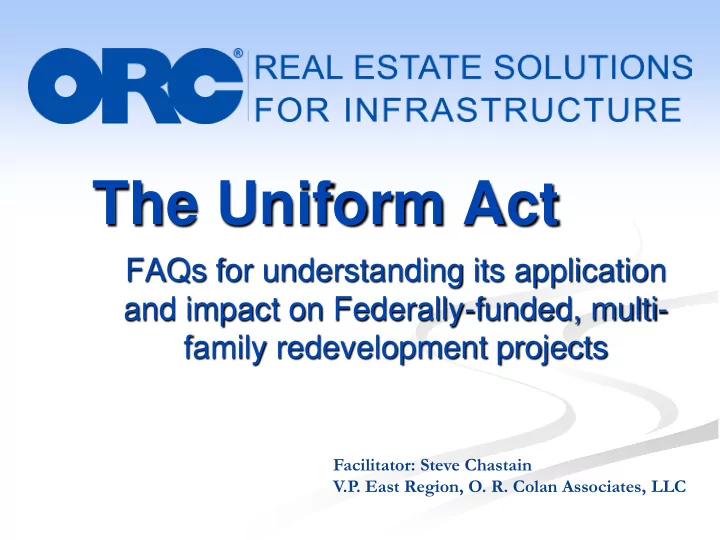

The Uniform Act FAQs for understanding its application and impact on Federally-funded, multi- family redevelopment projects Facilitator: Steve Chastain V.P. East Region, O. R. Colan Associates, LLC
What is the Uniform Act? https://www.hudexchange.info/news/new-video-ura-overview/
When does the Uniform Act apply? Federal funding anywhere on the project. If any future federal grant, loan or contribution is anticipated for the project.
Why should a developer or project owner understand the Uniform Act? Scope – it informs your approach and your staffing Schedule – statutory schedule components cannot be expedited Costs – statutory costs components must be considered
What should I know before I begin? Identify existing occupants and key demographics The number of occupants per unit Age of head of household Gross monthly income Modes of transportation Length of occupancy * Not an exhaustive list – See Site Occupant Record Form
What should I know before I begin? Will all occupants qualify to remain after the project’s completion? For example: If the new project is designed to provide elderly housing, non-elderly families will need to be permanently relocated.
What should I know before I begin? Are there occupants who do not qualify for assistance? Resident income or family status can affect eligibility. Residents not legally residing in the U.S. do not qualify for assistance.
What should I know before I begin? Is the preliminary survey of occupants already completed? If not, perform as soon as possible.
How can I be prepared for the unexpected? Obtain a description of the project and what changes will occur. Identify information on advisory services that will be provided to current occupants. Establish the notification process that will be followed for persons who must be temporarily or permanently relocated.
How can I be prepared for the unexpected? Identify housing resources to be made available for permanent or temporary relocation. Determine relocation costs that will be reimbursed such as moving costs, increased housing or utility costs, application fees, storage.
How can I be prepared for the unexpected? Develop return or re-occupancy policies for the completed project. Establish processes for compliance with Fair Housing and Civil Rights requirements. Include an appeal process.
Questions?
Recommend
More recommend